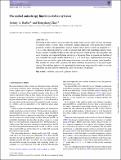Files in this item
On radial anisotropy limits in stellar systems
Item metadata
| dc.contributor.author | Barber, A.J. | |
| dc.contributor.author | Zhao, H. | |
| dc.date.accessioned | 2014-09-04T09:31:03Z | |
| dc.date.available | 2014-09-04T09:31:03Z | |
| dc.date.issued | 2014-08-21 | |
| dc.identifier | 145685033 | |
| dc.identifier | 6eea4ddc-cd7f-452d-8514-eb9087792e04 | |
| dc.identifier | 84904575343 | |
| dc.identifier | 000339924900059 | |
| dc.identifier.citation | Barber , A J & Zhao , H 2014 , ' On radial anisotropy limits in stellar systems ' , Monthly Notices of the Royal Astronomical Society , vol. 442 , no. 4 , pp. 3533-3543 . https://doi.org/10.1093/mnras/stu1059 | en |
| dc.identifier.issn | 0035-8711 | |
| dc.identifier.uri | https://hdl.handle.net/10023/5339 | |
| dc.description.abstract | Following earlier authors we re-examine the upper limits on the radial velocity anisotropy of general stellar systems; these constraints coming generically from phase-space density positivity, stability, and separability. Galaxy models almost always satisfy an inequality β <γ/2, i.e. the radial anisotropy is locally no greater than half of the logarithmic density slope. Some complex separable models are the only known cases which disobey this inequality and do so by having an exceptionally large anisotropy at the centre. Here we present newfamilies of non-separable but simple models which have β > γ/2. Such large, superthreshold anisotropy always occurs in a finite region in between an isotropic core and an isotropic outer boundary. Our models are always self-consistent and hence maintain the positivity of the phase-space density. Nevertheless, regions with superthreshold anisotropy are potentially subject to secular instability and may thus be observed in a short-lived phase of galaxies. | |
| dc.format.extent | 11 | |
| dc.format.extent | 596979 | |
| dc.language.iso | eng | |
| dc.relation.ispartof | Monthly Notices of the Royal Astronomical Society | en |
| dc.subject | Methods: analytical | en |
| dc.subject | Galaxies: haloes | en |
| dc.subject | QB Astronomy | en |
| dc.subject | QC Physics | en |
| dc.subject.lcc | QB | en |
| dc.subject.lcc | QC | en |
| dc.title | On radial anisotropy limits in stellar systems | en |
| dc.type | Journal article | en |
| dc.contributor.sponsor | Science & Technology Facilities Council | en |
| dc.contributor.institution | University of St Andrews. School of Physics and Astronomy | en |
| dc.identifier.doi | https://doi.org/10.1093/mnras/stu1059 | |
| dc.description.status | Peer reviewed | en |
| dc.identifier.grantnumber | PP/F000065/1 | en |
This item appears in the following Collection(s)
Items in the St Andrews Research Repository are protected by copyright, with all rights reserved, unless otherwise indicated.

